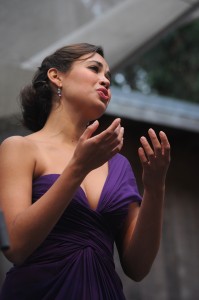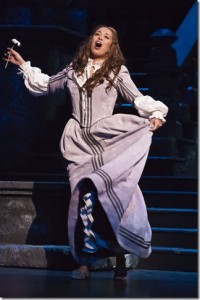
South Florida soprano Sierra wins Tucker grant
In a few days, Nadine Sierra is bound for Italy, where she’ll be singing in the oldest continuously operating opera house in Europe.
There in the Teatro di San Carlo in Naples, which opened in 1737 and whose house composers have included Giaochino Rossini and Gaetano Donizetti, she’ll sing four performances beginning May 18 of Verdi’s Rigoletto as the doomed heroine Gilda, a role she first sang here at Florida Grand Opera.
For one of those performances, she’ll be starring alongside a certain world-famous Siberian baritone.
“I found out that on the 22nd, Dmitri Hvorostovsky is going to be joining our cast as Rigoletto,” she said. “So I’ll sing with him, which is great.”
Earlier this week, Sierra won a $10,000 Richard Tucker Career Grant from the Richard Tucker Foundation, which honors the memory of Tucker, one of the finest American tenors of the mid-20th century. She was one of only two singers to win the grant this year (the other is the soprano Erin Morley, who appears next month in Poulenc’s Dialogues of the Carmelites at the Metropolitan Opera in New York).
Sierra is one of South Florida’s musical success stories, a Fort Lauderdale native who early on decided she wanted to sing opera and has made good on that dream.
She’s appeared locally with the Palm Beach Opera and Florida Grand Opera, nationally with Boston Lyric Opera, San Francisco Opera, San Francisco Symphony and Gotham Chamber Opera, given a Carnegie Hall recital, and won honors in the Metropolitan Opera National Council Auditions. Earlier this year she won first prize in the Victoria Dunne Singing Competition in Ireland.
Sierra, who is in Tampa for three performances of the Mozart Requiem with the Florida Orchestra beginning tonight, said the audition that led to the grant had only two arias, and was by invitation only. The audience invited to the audition included casting directors for major opera houses.
She started with the Italian bel canto repertoire: Oh, quante volte, Juliet’s moony Act I aria from Bellini’s version of the Romeo and Juliet story, I Capuletti ed I Montecchi (The Capulets and the Montagues).
“It’s gotten a reputation among people I know as a very long, boring and sometimes overdone aria, but I put it in there because I always feel like the thing you can do the best ― no matter what kind of reputation it has ― if you can do it really well, and you can prove people wrong, and show that it’s not a boring, overdone aria, than you can intrigue a lot of very, very important people,” she said.
The second audition piece was chosen by the committee, and it was as sharply contrasting a piece as could be imagined. The judges asked to hear Anne Truelove’s set piece No word from Tom … I go, I go to him from Act I of Stravinsky’s The Rake’s Progress.
“It’s a completely different style of music, and usually the judges choose … only the cabaletta section. But they wanted the whole thing,” Sierra said. “They were testing me … because they want to see how versatile singers are, how flexible they are from going to one character, in one style, one composer, straight into a completely different composer, character or style, and how well you could do that. I guess I proved I could do it well.”
The grant doesn’t have any restrictions on it as far as spending goes, and Sierra said that’s good because costs mount rapidly in the profession.
“For a singer, the expenses are really unreal. And $10,000 sounds like a lot, but it can go away very quickly with flights, with having to accommodate yourself, depending on which engagement you have to go to,” she said. “Because a lot of opera houses around the world will pay you a nice fee to perform; however, they won’t cover your accommodations or flight expenses. So every little dollar helps.”
Nadine Sierra as Gilda in Florida Grand Opera’s 2012 production of Verdi’s Rigoletto. (Photo by Richard Zendarski)
Now 24, Sierra said she finds the Italian bel canto repertoire of the early 19th century most congenial to her voice.
“Any light Verdi, any Bellini, any Donizetti, anything like that. For some reason, I just get it. I understand it and I love it,” she said. “Hopefully, I’ll be able to get into the Puccini and maybe even heavier Verdi as I get older. But Italian music is something I understand … Bel canto takes a lot of control and a lot of focus, but you have to pretend like it’s effortless on stage so that you can get the story across, even though you’re singing music that is technically very hard.”
Opera itself is going through something of a renaissance in audience appreciation these days, helped along by innovations such as the Met’s HD broadcasts in movie houses and the infinite variety of YouTube. But live theatrical productions of operas find it a challenge to compete, Sierra said.
“We as normal people watching movies are used to seeing them look unbelievably real. And Broadway shows are spending millions of dollars to make their special effects stand out and make their audience wowed by it,” she said. “And so in live theater, we’ve had to make everything bigger, better and more realistic to keep our audience interested and tickets selling.”
And that includes a mandate for glamour, a marked change from opera’s Victorian and 20th-century past, in which physical appearance mattered little and the voice was everything.
“In our era, beauty is not the morbidly obese singer. That’s not what it is anymore,” she said. “I know singers who get Botox and all that stuff because of this whole HD situation.”
Sierra lived in Fort Lauderdale until she was 13, when her family relocated to Delray Beach so Nadine could attend the Dreyfoos School of the Arts in West Palm Beach.
“My family is crazy supportive. They’re really something,” she said. Sierra is the middle child of three sisters; older sister Stephanie is a model and younger sister Melanie is a rising singer who appeared with her in January on a dual recital in the Sunday Afternoons of Music series.
After graduation she studied at the Mannes College of Music in New York, where she earned her bachelor’s degree, then spent two years as an Adler Fellow at the San Francisco Opera, finishing last December. After her Naples appearances next month, she’ll be at the Glimmerglass Festival in central New York in August for a staged version of Pergolesi’s Stabat Mater.
Sierra said she’s living a “gypsy” lifestyle these days, but wants her home base to be Miami, where she can be close to family. She said she is now much more aware of the challenges that a peripatetic singing career presents.
“I think the demands are far more apparent to me now than when I was a kid. Because when I was a kid, I felt, ‘They’re so good. It must be so easy for them, and it must be so enjoyable to travel like that all the time.’ As I got older, I learned, no, that’s actually the hard part about this career.
“The traveling is a humongous sacrifice. It’s a sacrifice to having a normal, settled life. And that’s a decision that every working singer has had to make: ‘Do I want to live this way, or do I not want to live this way?’” she said. “And for now, because I’m young, I don’t have a husband, I don’t have kids … I can still be that child I was many years ago, and feel free to do what I want to do and not feel the pressure as much as some of my older colleagues do.
“But later in life, I’m sure that pressure will come, and the demands will be harder to deal with,” she said.
And she wants to make sure to keep her career going when that happens.
“Thankfully, I’ve been able to go slow. I’m not singing at the Met yet. I’m not a superstar like [Russian soprano Anna] Netrebko was at my age, but I’m doing what I know how to do right now, in a healthy way, so that 20, 30 years from now, if opera is still around, I can still be at the top of my game and perform as well as I do today.”
Recent Content
-
Artsarticle ·
-
Artsarticle ·
-
Artsarticle ·


